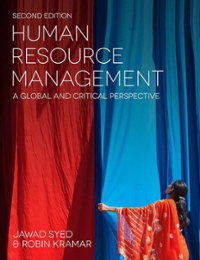Suzan, the head of the management department and a 55 -year-old Canadian, has been working at a
Question:
Suzan, the head of the management department and a 55 -year-old Canadian, has been working at a Swiss university with an international reputation for over 20 years. Due to budget-cutting and restructuring activities, Suzan's current main responsibility involves merging the departments of Management with Economics and Social Science into one Business School.
Since this was a public university in Switzerland, the associate professors and professors had secure and permanent positions. Thus, Suzan's proposal to cut down the personnel budget was to reduce the number of the teaching assistants within the departments. All teaching assistants had five-year contracts, and they also needed to undertake their doctoral studies as one of the requirentents in their contracts. There were twelve teaching assistants in both departments, and four of them would be finishing their contracts and graduating this summer. Suzan was planning to hire only two new assistants from the coming semester, because she thought the assistants could manage to deliver all seminars across the whole newly merged school. When Suzan announced her plan during the departmental meeting, all teaching assistants and professors strongly opposed it.
The teaching assistants complained that they were highly stressed and exhausted by being overloaded with heavy teaching hours, as well as their PhD research. Two of the assistants had serious burnout last year, and they took three months sick leave. The rest of the assistants had to share their workload. Some of them only had 30 -minutes lunch breaks between two seminars, and all of them had to work during weekends to catch up with their PhD studies. Most of them did not use their annual leave last year. They argued that they would be unable to deliver the seminars that Suzan was proposing.
The professors also emphasised that students had been complaining that the assistants just uploaded the solutions online without detailed explanations, and they were not happy with the limited office hours the assistants could offer. The assistants argued that they were unable to deliver quality teaching and research when they were so overloaded.
Suzan could totally empathise with all the problems raised by the assistants, as she had been experiencing similar issues herself over the last few years in terms of feeling overloaded and unable to cope. She was extremely busy with her administrative duties and research tasks, and she had to work overtime nearly every day, including weekends. Her husband had been supportive and he took care of most home issues. Sometimes he joked with Suzan telling her she was married to her job and not him!
Researching WLB initiatives in your country
- You can work individually, or work in a group for this exercise.
- Are you aware of any legislation in relation to WLB in your home country? If yes, please identify the legislation(s). If no, you can now do some research and find out related legislations.
- Analyse the development of the legislations.
- Explore the current implementation and impact of the legislations in your country.
Step by Step Answer:

Human Resource Management A Global And Critical Perspective
ISBN: 9781137521620
2nd Edition
Authors: Jawad Syed, J; Kramar Syed, Robin Kramar





